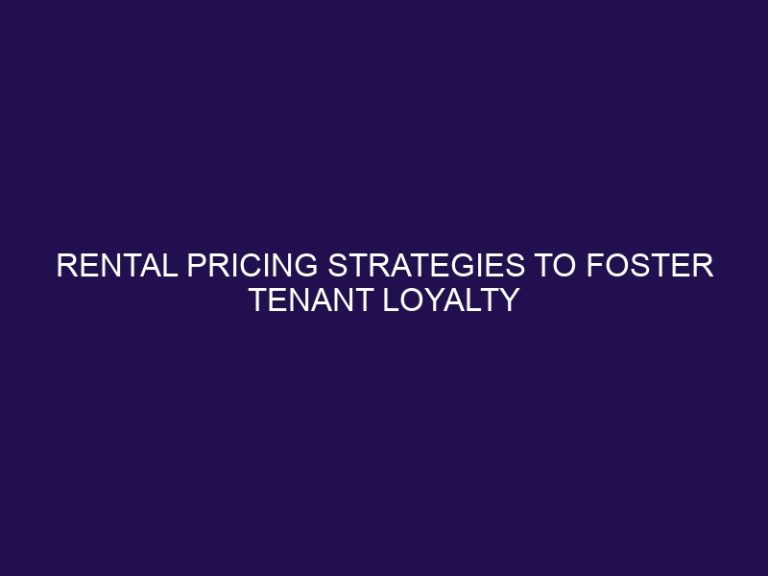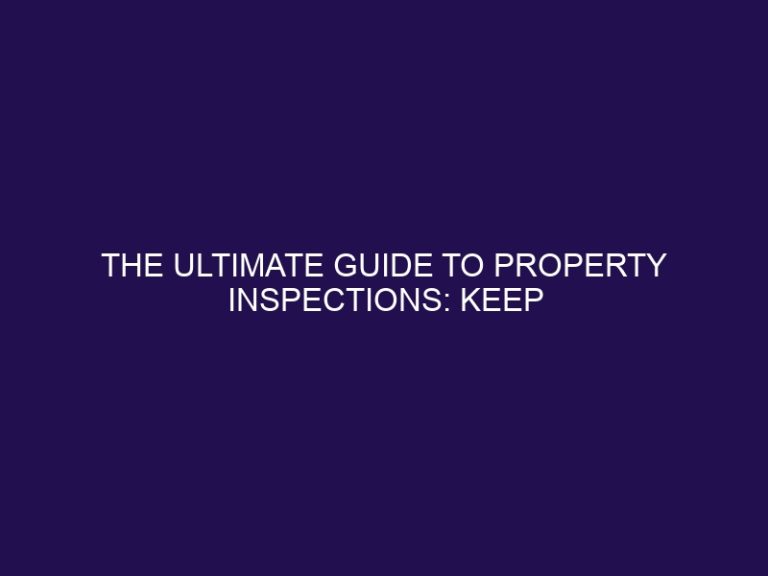Everything Ontario Landlords Need To Know About Tax Deductions
Understanding the tax deductions available for rental properties is crucial for Ontario landlords to maximize their financial benefits and ensure compliance with tax regulations. Tax deductions for rental properties refer to specific expenses that can be deducted from taxable rental income, reducing the amount of tax owed. By taking advantage of these deductions, landlords can lower their overall tax liability and increase their profitability.
Tax deductions are particularly important for Ontario landlords due to the unique tax laws and regulations in the province. Familiarizing yourself with these deductions can help you make informed financial decisions, minimize tax burdens, and optimize your rental property investment.
There are several common tax deductions available for Ontario landlords to consider, including:
- Mortgage Interest: Deducting the interest paid on your rental property mortgage.
- Property Taxes: Deducting the property taxes paid on your rental property.
- Insurance Premiums: Deducting insurance premiums related to your rental property.
- Repairs and Maintenance: Deducting the costs of repairs and maintenance on your rental property.
- Utilities: Deducting the utility expenses associated with your rental property.
- Advertising and Marketing: Deducting the expenses related to advertising and marketing your rental property.
- Property Management Fees: Deducting the fees paid to property management companies.
- Legal and Professional Fees: Deducting fees paid to lawyers, accountants, or other professionals for rental property-related services.
- Capital Cost Allowance (CCA): Deducting a portion of the cost of your rental property over several years.
To ensure accurate reporting and eligibility for these deductions, it is crucial for landlords to keep track of their expenses and receipts. Accurate record-keeping is essential for substantiating deductions claimed and avoiding potential issues during tax audits. Organizing your expense records systematically will facilitate the tax filing process and make it easier to claim deductions.
Although it is essential to have a basic understanding of tax deductions for rental properties, seeking professional tax advice is highly recommended. Tax professionals specializing in real estate can provide valuable insights, help identify additional deductions, and ensure compliance with the complex tax regulations specific to Ontario landlords.
By familiarizing yourself with Ontario’s tax deductions for rental properties, maintaining thorough expense records, and seeking professional advice when needed, you can optimize the financial benefits of your rental property investment and navigate the tax landscape with confidence.
Understanding Tax Deductions for Rental Properties
Understanding tax deductions for rental properties is crucial for Ontario landlords to minimize their tax liability and maximize their profits. Here are some key deductions to consider:
- Mortgage Interest: Deduct the interest paid on the mortgage used to acquire or improve the rental property.
- Property Taxes: Deduct the annual property taxes paid on the rental property.
- Repairs and Maintenance: Deduct expenses for repairs, maintenance, and replacements of items like appliances or fixtures.
- Utilities: Deduct a portion of the utilities if they’re paid by the landlord.
- Insurance Premiums: Deduct the premium for insurance coverage on the rental property.
By understanding tax deductions for rental properties, Ontario landlords can effectively minimize their tax liability and maximize their profits. These deductions include mortgage interest, property taxes, repairs and maintenance, utilities, and insurance premiums. Considering these deductions is crucial to ensure compliance with tax regulations and achieve significant tax savings.
What Are Tax Deductions for Rental Properties?
Tax deductions for rental properties, also known as deductions for rental properties, are expenses that landlords can deduct from their taxable income. These deductions are essential for Ontario landlords as they help lower their taxable income and increase their profitability. Mortgage interest, property taxes, insurance premiums, repairs and maintenance costs, utilities, advertising and marketing expenses, property management fees, legal and professional fees, and capital cost allowance are all examples of these deductions.
To properly claim these deductions, landlords need to keep accurate records of their expenses and receipts. Seeking professional tax advice can also be beneficial in optimizing deductions and maximizing tax savings. Staying organized throughout the year and documenting all expenses will make tax time easier and ensure you don’t miss out on any potential deductions.
Why are Tax Deductions Important for Ontario Landlords?
Tax deductions are important for Ontario landlords because they can significantly reduce their taxable income, resulting in lower tax liabilities. By claiming deductions, landlords can offset expenses incurred in the maintenance, management, and operation of their rental properties. This includes mortgage interest payments, property taxes, insurance premiums, repairs and maintenance, utilities, advertising, property management fees, legal fees, and capital cost allowance. Maximizing deductions can help landlords save money and increase their profitability. It is essential for landlords to keep accurate records and seek professional tax advice to ensure compliance with tax laws and claim all eligible deductions. With proper tax planning, Ontario landlords can optimize their financial position and achieve long-term success.
Common Tax Deductions Available for Ontario Landlords
As an Ontario landlord, you’ll be pleased to know that there are numerous tax deductions available to help ease the financial burden. From mortgage interest to property taxes, repairs, and maintenance to advertising and marketing, this section explores the common tax deductions specifically tailored for Ontario landlords. We’ll shed light on the various expense categories and how they can save you considerable money come tax season. So, let’s dive in and discover all the potential deductions that can maximize your investment returns.
Mortgage Interest
Mortgage interest is a pivotal tax deduction for landlords in Ontario. It serves as a means for them to offset rental income and effectively reduce their taxable income. Landlords can considerably diminish their tax liability by deducting the interest paid on their mortgage. It is crucial for landlords to maintain precise records of their mortgage payments and ensure they possess undeniable evidence of the interest paid. Seeking the guidance of professional tax advisors is highly recommended to guarantee that landlords comprehend the eligibility criteria thoroughly and capitalize on their deductions. The mortgage interest deduction presents an opportunity for landlords to save money and enhance their financial standing.
Property Taxes
Property taxes are an important aspect of owning a rental property. They are levied by the local government based on the assessed value of the property. It is crucial for Ontario landlords to understand the implications of property taxes and how they can impact their finances. Here is a table summarizing the key information related to property taxes for rental properties:
| What are Property Taxes? | Taxes levied by the local government on the assessed value of the rental property. |
| Importance of Paying Property Taxes | Failure to pay property taxes can lead to penalties, interest charges, and even tax liens on the property. |
| Impact of Property Taxes on Rent | Property taxes can affect the profitability of a rental property and may need to be factored into rental rates. |
| Applying Property Taxes as Deductions | Ontario landlords can deduct property taxes as operating expenses when calculating their rental income for tax purposes. |
To ensure compliance and make informed financial decisions, landlords should keep accurate records of their property tax payments. Seeking professional tax advice can also help in understanding the nuances and maximizing the benefits of property tax deductions. Proper management of property taxes is key to maintaining a successful and profitable rental property business.
Insurance Premiums
Insurance Premiums for rental properties are an important expense that can be tax-deductible for Ontario landlords. These premiums protect landlords from potential liabilities and damages to their properties. Here is a breakdown of insurance premiums for rental properties:
| 1. Coverage | Landlords should have comprehensive insurance coverage that includes property damage, liability protection, and loss of rental income. |
| 2. Deductibility | Insurance premiums paid for rental properties are tax-deductible expenses, reducing the overall taxable income of landlords. |
| 3. Records | Landlords should keep detailed records of insurance premium payments, including receipts and policy documents, for tax purposes. |
In a true story, a landlord named Sarah experienced a fire in one of her rental properties. Luckily, she had insurance coverage and was able to claim the damages. The insurance premiums she had been paying for years turned out to be a wise investment, providing financial protection and peace of mind. Remember, insurance premiums are not only essential for securing your rental property but also offer tax benefits for Ontario landlords.
Repairs and Maintenance
When it comes to tax deductions for rental properties in Ontario, repairs and maintenance expenses play a significant role. Repairs and maintenance are key aspects to consider when dealing with rental property expenses. Here are some steps to naturally incorporate repairs and maintenance for your rental property:
- Regular Inspections: Conduct routine inspections to identify any repair needs or maintenance issues related to repairs and maintenance.
- Prompt Repairs: Address repairs promptly to prevent further damage and ensure tenant satisfaction with repairs and maintenance.
- Document Expenses: Keep detailed records of all repair and maintenance expenses, including receipts and invoices for repairs and maintenance.
- Deductible Expenses: Determine which repair and maintenance expenses are deductible and claim them on your tax return for repairs and maintenance.
- Hire Professionals: For complex repairs, it may be necessary to hire licensed professionals to ensure the work is done correctly when it comes to repairs and maintenance.
- Keep Proof of Professional Services: Keep records of any professional services hired for repairs or maintenance, ensuring the documentation for repairs and maintenance.
By following these steps, you can properly manage repairs and maintenance for your rental property while maximizing your eligible tax deductions related to repairs and maintenance.
Utilities
Utilities play a vital role in the operation of rental properties for Ontario landlords. They play an essential role in keeping track of utility expenses for tax deduction purposes. Here is a breakdown of the utility-related expenses that landlords can deduct:
| Electricity: | This includes the electricity utilized to power common areas such as hallways and outdoor lighting. |
|---|---|
| Water and Sewage: | The expenses incurred in supplying water to the rental property and any fees related to sewage or wastewater can be deducted. |
| Natural Gas or Heating Oil: | Landlords can deduct expenses associated with heating the property, including the cost of natural gas or heating oil. |
| Garbage and Recycling: | The fees paid for garbage collection or recycling services can be included in the deductions. |
| Internet and Cable: | If the landlord provides internet or cable services as part of the rent, they can claim a portion of the expenses. |
It is crucial for landlords to maintain accurate records of their utility expenses for documentation and future reference. Seeking professional tax advice can assist landlords in navigating the complexities of tax deductions for utilities and maximizing their financial benefits.
Advertising and Marketing
Advertising and marketing expenses play a crucial role for Ontario landlords as they are an important tax deduction. These expenses can greatly assist landlords in quickly finding tenants and effectively promoting their rental properties.
- Online advertising: These are expenses incurred in listing properties on rental websites such as Kijiji or Craigslist.
- Print advertising: These are the costs associated with placing advertisements in local newspapers, magazines, or rental guides.
- Signage: These expenses cover the creation and installation of “For Rent” signs on the property.
- Photography and videography: This includes the costs of professional photos or virtual tours to exhibit the property.
- Marketing materials: These are the expenses involved in creating brochures, flyers, or business cards.
- Website development: These costs refer to building and maintaining a website specifically designed to market rental properties.
- Social media advertising: These expenses are linked to promoting rental properties on popular platforms like Facebook, Instagram, or Twitter.
Allow me to share a true story: An Ontario landlord was struggling to find tenants for their rental property. However, after investing in online advertising and professional photographs, they experienced a surge in inquiries and managed to successfully rent out the property within a week.
Property Management Fees
A Vital Expense for Ontario Landlords
Property management fees play a crucial role in the financial landscape of Ontario landlords. These fees encompass the costs associated with professional property management services, such as tenant screening, rent collection, property maintenance, and addressing tenant issues.
Regarding tax deductions for rental properties, landlords have the privilege of claiming property management fees as allowable expenses. This advantageous provision enables landlords to subtract these fees from their rental income, thus reducing their taxable rental profit. To ensure precise record-keeping and maximize deductions, landlords must diligently track their property management fees along with related expenses while also considering seeking professional tax advice.
Legal and Professional Fees
Legal and Professional Fees are important expenses that Ontario landlords can deduct on their taxes. These expenses may include payments to lawyers, accountants, property managers, and other professionals. It is crucial for landlords to maintain accurate records of these expenses in order to claim deductions. To provide a breakdown, here are some common fees that landlords can deduct:
| – Legal fees: | This includes fees paid for services such as drafting or reviewing lease agreements, eviction proceedings, and legal consultations. |
| – Accounting fees: | These fees cover bookkeeping, tax preparation, and financial advice. |
| – Property management fees: | Landlords can deduct the fees paid to property management companies for their services. |
| – Professional association fees: | This category includes membership fees paid to organizations related to property management. |
To ensure the maximum deductions and compliance with tax regulations, landlords should keep track of these expenses and seek guidance from a tax professional.
Capital Cost Allowance
The Capital Cost Allowance (CCA) is a crucial tax deduction available to Ontario landlords. This deduction allows landlords to gradually recover the cost of depreciable assets over time. Here are some essential points about the CCA:
-
Covering asset depreciation: The CCA helps landlords recover the cost of assets, such as buildings, furniture, and equipment, utilized in their rental properties.
-
Claiming depreciation: Landlords can claim a portion of the asset’s cost as an annual depreciation expense, which effectively reduces their taxable rental income.
-
Calculating CCA: The CCA calculation depends on the type of asset and the prescribed CCA class it falls under. Each class has a specific depreciation rate.
-
Eligible assets: Most depreciable assets used in the rental property, with the exception of land, are eligible for the CCA deduction.
-
Record-keeping: Landlords must maintain accurate records of the cost and date of acquisition of each depreciable asset, as well as any subsequent improvements or disposals.
By leveraging the Capital Cost Allowance, Ontario landlords can effectively reduce their tax liability and optimize the profitability of their rental properties.
Keep Track of Your Expenses and Receipts
Keeping track of your expenses and receipts is crucial for Ontario landlords when it comes to tax deductions. It’s all about being organized and ensuring accurate record-keeping. In this section, we’ll uncover the importance of keeping detailed expense records and the benefits it brings. Let’s dive into the world of financial management and learn how it can save landlords time, money, and potential headaches.
Importance of Accurate Record-Keeping
Accurate record-keeping plays a crucial role for landlords in Ontario, emphasizing the importance of accurate record-keeping when it comes to tax deductions for rental properties. By maintaining comprehensive records of expenses and keeping receipts, landlords can provide concrete evidence of their deductible expenses and ensure compliance with tax regulations. The significance of accurate record-keeping allows landlords to not only claim deductions such as mortgage interest, property taxes, repairs, and maintenance but also to navigate potential challenges during tax audits. Failing to maintain proper documentation could result in missed deductions and increased tax liabilities. Hence, it is essential for landlords to maintain well-organized and up-to-date records in order to maximize deductions and minimize tax liabilities. Here’s an intriguing fun fact: The IRS states that individuals spend an average of 13 hours annually organizing their records for tax purposes.
Organizing Your Expense Records
Organizing your expense records is crucial for Ontario landlords to ensure accurate tax deductions and follow legal requirements.
- Save receipts for expenses related to your rental property, such as repairs, maintenance, and professional fees, in order to organize your expense records.
- Create categories for different types of expenses to easily track and calculate deductions, thus helping in organizing your expense records.
- Consider using accounting software or apps to store and organize electronic copies of receipts and create expense reports, as part of organizing your expense records.
- To simplify record-keeping and avoid mixing personal and business finances, use a dedicated bank account for rental property expenses, aiding in organizing your expense records.
- Keep physical copies of receipts organized in a filing system or a binder for easy retrieval when needed, contributing to organizing your expense records.
- Regularly review your expense records, reconcile them with your bank statements, and promptly address any discrepancies, which is an essential part of organizing your expense records.
- Retain your expense records for at least six years, as required by the Canada Revenue Agency (CRA), for effective organization of your expense records.
Seeking Professional Tax Advice
Seeking professional tax advice is essential for Ontario landlords who aim to optimize their deductions and ensure compliance with tax regulations. An experienced tax professional can expertly navigate landlords through intricate rules and assist in identifying all eligible deductions, including expenses for repairs, maintenance, or property management fees. Additionally, they can offer valuable insights on capital gains taxes and the potential advantages of incorporating as a landlord. With the guidance of a tax professional, landlords can effectively reduce their tax liability while abiding by the law. It is important to note that tax laws and regulations undergo frequent changes, underscoring the significance of seeking professional advice to remain up to date.
Fact: According to a survey, approximately 80% of real estate investors leverage professional assistance for tax planning and compliance.
Frequently Asked Questions
1. What are rental property tax deductions and how can they benefit Ontario landlords?
Rental property tax deductions are eligible expenses that landlords can deduct from their rental income to lower their tax liability. By taking advantage of these deductions, Ontario landlords can maximize their profits and minimize their tax burden.
2. What are the different types of expenses that landlords can deduct from their rental income?
Landlords can deduct both current expenses and capital expenses. Current expenses, such as repairs and office expenses, can be deducted in full in the relevant tax year. Capital expenses, which enhance the value of the property, must be added to the property’s value and depreciated over time.
3. Can landlords deduct expenses such as advertising fees and home insurance premiums?
Yes, landlords can deduct fees paid for advertising their rental property on online rental websites, as well as property insurance premiums. These expenses are considered current expenses and can be fully claimed in the relevant tax year.
4. Can landlords deduct mortgage interest and bank charges related to their rental property?
Absolutely. Landlords can claim mortgage interest and interest on loans used to finance the purchase or improvement of the rental property. Additionally, bank charges related to the rental property can also be deducted as current expenses.
5. Can landlords deduct professional fees and property taxes for their rental property?
Yes, landlords can deduct professional fees paid to accountants or tax experts as well as property taxes paid to the municipality. However, it’s important to only claim the portion of property taxes that relates specifically to the rental property.
6. Are there any tax implications for landlords who use their rental property as their principal residence?
If a rental property is also used as the landlord’s principal residence, there may be tax implications. In such cases, certain expenses may not be fully deductible, and there may be grey areas regarding which expenses can be claimed. It’s advised to consult a tax specialist to ensure compliance with tax regulations.







